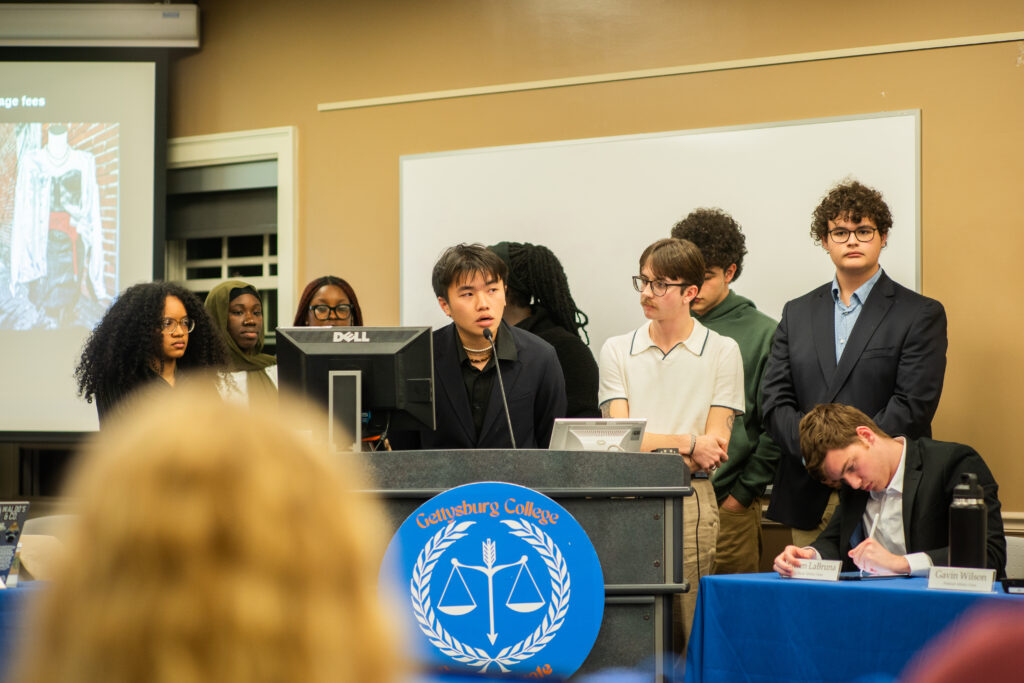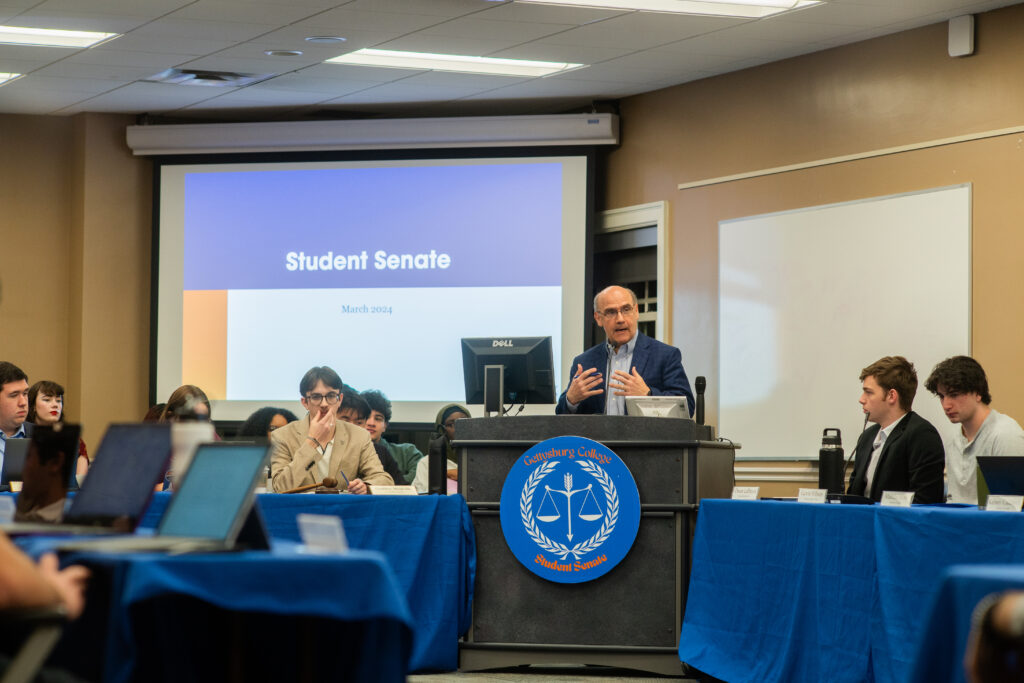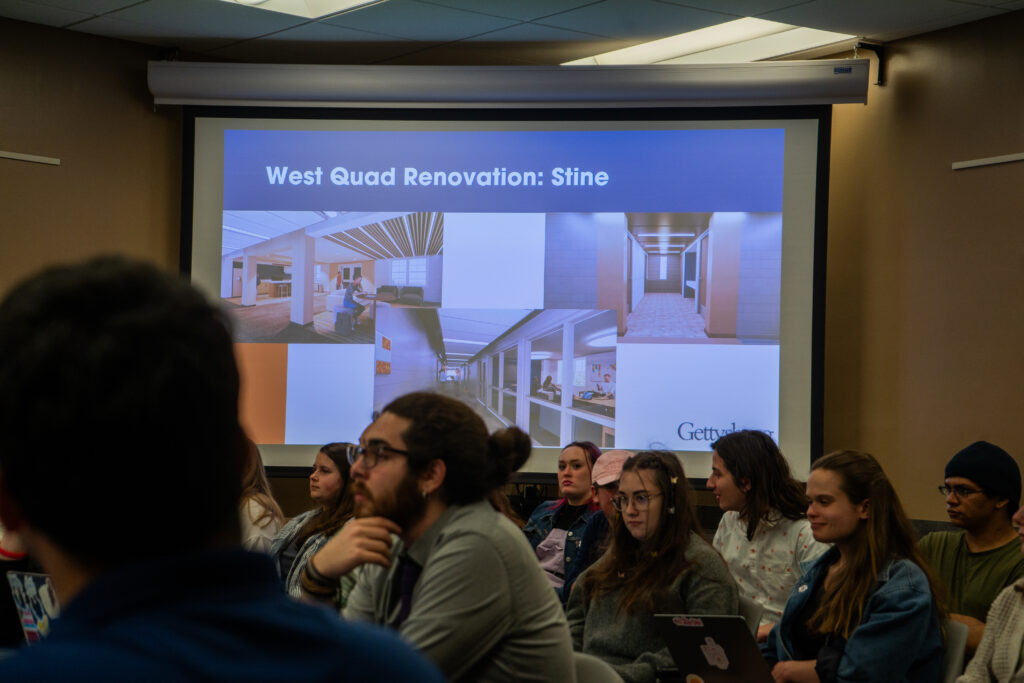By Ella Prieto, Managing Editor and William Oehler, Director of Photography
Guest Speaker
The Guest Speaker section occurred first, as President Bob Iuliano, Vice President for College Life Anne Ehrlich and Provost Jamila Bookwala. The trio began with a presentation, which covered academic, enrollment and administrative updates, enhancing demand, other revenue-generating steps, initiatives that impact current students and next steps.
Ehrlich provided the agenda and also informed students of the intranet site mentioned at last week’s Student Senate meeting. This site is similar to the intranet site employees have access to. She also explained that it is only available through a login because “…[the site] has a whole bunch of information that’s kind of unique to our community, and it’s very hard to understand and can be easily misinterpreted without context. So we don’t necessarily want random prospective families looking at it without knowing that you all have.”
Bookwala then began with academic updates. She first explained how faculty governance works, clarifying that different committees are formed by the faculty. Faculty is also responsible for creating or dismantling majors and minors. She then moved into how course maximums and minimums are going to be decided in tiers based on the course level. These new numbers have been decided upon with faculty, with the goal of tiers being even.
Furthermore, Bookwala assured that no faculty positions were going to be eliminated. However, they are decreasing the allowance for visiting professors, choosing to instead allocate more resources to tenured faculty and lecturers who spend more time at the College. No departments or majors are going to be eliminated either. The Provost’s Office is working to grow programs or possibly organize departments differently. For example, having multiple departments be under one umbrella department. Bookwala also assured that there is no intention to get rid of any majors.
The final two updates were that the Provost Office is working to spread out the teaching day and reevaluate study abroad. Associate Provost for Academic Affairs Jeanne Hamming evaluated the times of classes and found that many conflicted with each other. Thus, they have spread out the times of classes for students to take more courses. Study abroad is being reevaluated to provide more flexible options for students and reduce costs where appropriate. Some proposed ways to do this were to offer shorter study abroad experiences and to have faculty lead study abroad courses.
Ehrlich then gave the administration update, which she divided into two categories: simple and complicated. Simple changes do not cross over multiple parts of the college while complicated ones do.
The simple changes were a proportionate reduction in dining staff and consolidation of administrative assistant positions when appropriate.
“Nobody in Dining [Services] is getting fired,” stressed Ehrlich. “But as some people leave dining, for example, there are some positions we will replace and some positions we will not replace in proportion to the size of the study body.”
This same process will happen with administrative assistants. Ehrlich stated that doing so seems to be working, but they will continue to reevaluate.
The complicated updates encompassed a proposed One-Stop-Shop and technology efficiencies. The proposed shop would bring together the Registrar, Financial Aid and Student Accounts into one physical space and one virtual space for student ease. The technology efficiencies have already begun, with the announced Wi-Fi updates. However, the College is also looking to reduce duplicative or old platforms.
Ehrlich then moved into how the College is enhancing demand. The Guided Pathways program has continued to operate, with 76% of First Years opting in. Part of the program is a personal advising team, which the College is evaluating with focus groups comprised of First Year students at the end of the year. The College is also looking to run micro-credentials, which have been found to help graduates in their job searches. The Center for Career Engagement (CCE) has also been expanded to accommodate student needs. Furthermore, the College will ensure that every student has access to a career-ready experience, such as the Garthwait Leadership Center’s Leadership Certificate, an Immersion trip with the Center for Public Service or an internship. Finally, Ehrlich commented on the good media attention the College has received and their work to maintain as well as increase retention rates.
Next, Iuliano provided an enrollment update. He stated that while the College has had a record number of applications in recent years, they have decided to purposefully shrink the incoming class size to 550, thus shrinking the overall student population. This decision was made to enhance the College’s selectivity while also being able to provide more resources to students.
Iuliano transitioned into other revenue-generating steps. These include the expansion of the Masters in American History, increasing summer online courses and establishing a relationship with Amblebrook. Furthermore, the College had the best fundraising year in its history. However, he explained that money donated is not immediately available for use, but that it serves as a sign that alumni and friends of the College believe in its mission and work.
The final section was about investments that impact current students, including new majors, graduate and professional school pipelines, micro-credentials, improving the Wi-Fi, Servo enhancements, stadium lights and residence hall renovations. Iuliano specifically commented on the residence hall renovations.
“We’re at the very, very, very earliest stages, but with a real plan to do something about at least the First Year residence halls,” said Iuliano.
Ehrlich then took over to discuss the next steps and communications. She stated that there will be opportunities for student input on projects and that students can submit questions via the student intranet.
The floor was then opened for questions moderated by Vice President Geoffrey Meadville ’25.
Senator Jack Murphy ’24 asked how the College is working to preserve the integrity of the academic learning environment regarding class sizes increasing.
Bookwala responded that her office has worked very hard to retain small class sizes that students benefit from. However, they have had to make some choices due to financial strain, and after conducting a comparative advantage study on schools similar to Gettysburg, they found that the decision to slightly increase class sizes made sense. She also stressed that some courses, such as First-Year Seminars and Capstones will remain at their current size. Additionally, these course sizes are not etched in stone, and exceptions may be made for courses that demonstrate the need to have a smaller class size.
Senator Owen Labruna ’24 asked the next question about changes in the new curriculum. Bookwala explained that the curriculum was voted on by the faculty last spring, so faculty members have more knowledge on that topic.
Senator Ethan Avecedo ’26 asked why lab sections were being cut. Bookwala answered that the Provost’s Office has not required any labs to be cut. They have, however, looked at increasing labs’ class sizes.
Senator Olivia Taylor ’25 asked for more information regarding what the course schedule improvements will look like. Bookwala elaborated on her previous comments concerning this topic, stating that a majority of class times occurred between 10 a.m. and 2 p.m. By spreading out classes, there will now be 20% fewer conflicts. This change will take place in the fall semester of this year.
A student then raised a concern that there had been no communication from the administration to the faculty about changes. Bookwala assured that they have met with chairs from every department and held multiple open discussions on varying days and times in the hopes that the maximum number of faculty members would be able to attend.
Acevdeo raised another concern about a quote from Iuliano in his interview with Inside Higher Ed.
Iulinao answered that the College is working to have students who can afford to pay more do so, not cut financial aid.
Chair of the Academic and Career Affairs Committee Andrew Thibaudeau ’26 asked why there are not more statistics on the intranet. Ehrlich explained that the site was designed to answer questions regarding restructuring, but that it can be updated.
Meadville asked the final question, questioning if a standardized Artificial Intelligence (AI) policy could be installed, as it is currently confusing and complicated to navigate through every professor’s separate policy.
Bookwala said that faculty ultimately control their syllabi; however, they are working to have at least a shared understanding of how AI can be used as a tool instead of a thing to be policed. Additionally, discussions about this topic among faculty members have been occurring,
Officer Reports
Treasurer Alfredo Roman-Jordan ’26 shared the updated budget report through the Senate Minutes sent out in the email published by Secretary Grace Nelson ’26’.
Committee Reports
There will be no Budget Management Committee (BMC) meeting this Friday.
Club Reports and Announcements
The Gender and Sexuality Resource Center (GSRC) and Artem will be hosting a lawn chair painting event Wednesday, March 20. The event will be held outside the GSRC on Memorial Field from 5 to 6 p.m.
Hillel and Artem will be holding a Purim event. Traditional foods will be served while attendees are invited to make masks and dress in costume. The event will be held in CUB 260 and will start at 6:15 p.m. on Friday, March 22.
The College Theme House Application went live, and the form can be accessed by an email sent out to the campus community or by this link.
Student Concerns
Senator Hannah Repole ’24 requested better access to HDMI dongles and other connection cables in classrooms and meeting rooms. Repole also brought up the concern about cables being stolen.
A student questioned whether the updates to Wi-Fi, which were described in a campus-wide email sent out by Rodney Tosten on Feb. 29, would extend to devices such as Smart TVs, gaming consoles and other devices that may not have a browser or ethernet ports.
Concerns surrounding the police presence on campus in recent weeks were brought up by Senator Eliza Hoover ’26 and Roman-Jordan. Their concerns also requested increased communication with Police Chief Robert Glenny.
Budget Requests
Gettysburg African Student Association (GASA) and Gettysburg Fashion Initiative brought their joint budget to host the Noir La Fête Gala. The Gala will feature many on and off-campus organizations to increase representation within the fashion community in Gettysburg.

President of the Gettysburg College Fashion Initiative Dan Nguyen ’26 presenting the budget for the Noir La Fête Gala. (Photo William Oehler/The Gettysburgian)
During the BMC meeting, GASA and the Gettysburg Fashion Initiative requested a budget of $8,620. The two organizations were asked to find areas to reduce the costs. This led to a decreased budget of $7,889. The full original budget of $8,620 was passed unanimously after a short discussion.
Old Business
Roman-Jordan attended the College Life Advisory Committee (CLAC) and held a conversation about how to best use future Senate funds. There were a few options presented to the floor, but no distinct costs or decisions were made.
The discussion was tabled to the next meeting time, after spring break.
New Business
Meadville addressed the Senate body with disappointment in how the members conducted themselves during the guest speaker portion of the meeting. Meadville requested increased respect when guest speakers attend meetings to have better conversations with College administrators and staff.
Meadville also highlighted the need to focus more on student needs and concerns. He cited the need to shift away from bringing faculty-specific concerns as faculty have their own governing body in concert with the administration. He expressed that the Senate’s job is to the student body, not the faculty.


